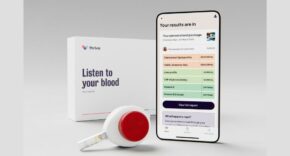
A new project is underway in Lewisham to develop the educational resources needed to train healthcare professionals on how to use novel AI-powered results to diagnose respiratory illnesses.
Chronic Obstructive Pulmonary Disease (COPD) is a long-term condition of the lungs where the flow of air to the lungs is obstructed. Traditional diagnosis relies on spirometry, a test requiring patients to forcefully exhale into a machine. However, spirometry can be challenging for some patients and requires trained personnel, leading to delays in diagnosis. One in eight respondents to an Asthma + Lung UK survey reported waiting more than 10 years for a diagnosis.
TidalSense, a medical technology company, has developed N-Tidal, a handheld device that will offer a patient-friendly alternative diagnostic approach that uses AI to improve the speed and accessibility of COPD diagnosis. Patients simply breathe normally into a mouthpiece for 75 seconds, and the device will analyse the pattern of CO2 in their breath using AI to determine the likelihood of them having COPD.
While NHS commissioners are already planning to use N-Tidal in the NHS, TidalSense is committed to giving healthcare professionals the skills and confidence to use this AI-powered technology.
According to NHS Digital, AI holds immense potential to revolutionise healthcare, however successfully integrating it hinges on building confidence and competence among healthcare professionals. In its report, NHS Digital explains that educating healthcare workers to develop, implement, and use AI effectively and safely requires specialised product-specific training to enable healthcare workers to use AI technologies within their specific fields.
“With every new NHS technology deployment, there is a knowledge gap that must be overcome, and integrating AI into the diagnosis of COPD in primary care is no exception,” explains Dr Matea Deliu, academic GP and Associate Medical Director for One Health Lewisham, on the project. “This project aims to bridge that gap by developing resources to equip clinicians with the necessary understanding of how N-Tidal’s AI-driven results are generated and how they can be effectively incorporated into clinical decision-making. The development of this training also has the potential to serve as a framework for future AI-powered medical tools.”
The project, funded by the National Institute for Health and Care Research (NIHR), will focus on three key areas:
- Real-world implementation: N-Tidal will be used alongside existing practices within One Health Lewisham, an integrated community provider in South East London running the virtual ward/NHS@Home. This will allow healthcare professionals to become familiar with the device and its results in a controlled environment.
- Needs assessment: healthcare professionals involved in the project will be interviewed to identify specific areas where training is needed.
- Development of training resources: Based on the needs assessment, the project will create video and online training modules specifically tailored to N-Tidal. These resources will be readily available for use in any setting where N-Tidal will be deployed.
“N-Tidal has the potential to significantly improve COPD diagnosis across the NHS, which is why it’s important that we work to remove the barriers to adoption,” commented Dr Ameera Patel, CEO of TidalSense. “This programme will ensure we can collaboratively develop the training resources required to enable GPs to understand and access our technologies, ultimately leading to faster diagnosis for patients. Furthermore, the framework developed through this project can pave the way for the smooth adoption of future AI technologies in healthcare.”












